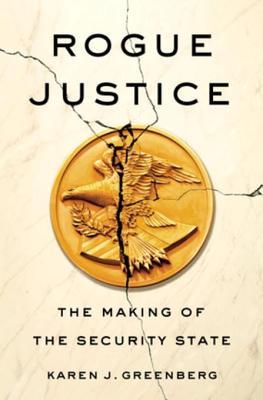
Rogue Justice
The Making of the Security State
کتاب های مرتبط
- اطلاعات
- نقد و بررسی
- دیدگاه کاربران
نقد و بررسی

Starred review from April 15, 2016
A terrifying history of American surveillance in the 21st century that shows how the government has eroded civil liberties since 9/11.Most people are familiar with Guantanamo torture allegations and National Security Agency wiretapping, but few understand the legal maneuvering that makes such transgressions possible. Greenberg (The Least Worst Place: Guantanamo's First 100 Days, 2009, etc.), the director of the Center on National Security at Fordham University School of Law, shows how our right to privacy didn't change overnight but rather steadily unraveled in Congress and the courts. She opens with the horrific events of 9/11, which led to a widespread overhaul of FBI and CIA practices. Their attempts to "tear down the wall" and share intelligence came with numerous legal side effects. The government tested new policies with the arrest of John Walker Lindh, a U.S.-born jihadi with ties to Osama bin Laden. The George W. Bush administration debated how to prosecute him, whether as a traitor or enemy combatant. At the center of Greenberg's story is John Yoo, Deputy Assistant U.S. Attorney General, who helped authorize waterboarding and other "enhanced interrogation techniques." The author fully explains the government's panicked motivation for permitting torture and secretly watching its own citizens. Yet the book's central question is timeless: once a government takes rights away, can they ever be restored? When Congress passed the Military Commissions Act of 2006, autocracy triumphed. "[MCA] would allow coerced confessions to be entered into evidence," writes Greenberg. "This abrogation of rights was no longer lurking in the shadows of closely held (and shoddily argued) legal memos; nor was it merely something 'stumbled upon.' It was now the law of the land." That law continues to haunt the current administration, and there have never been enough whistleblowers to amend the damage. "As unambiguous as Obama's rejection of these policies was," writes the author, "he seemed at the outset to be averse to rounding up their perpetrators." A sophisticated study of executive tyranny in the never-ending war on terror.
COPYRIGHT(2016) Kirkus Reviews, ALL RIGHTS RESERVED.

Starred review from June 1, 2016
This book looks at U.S. national security policies since 9/11, questioning their effectiveness. Greenberg (director, Ctr. on National Security, Fordham Univ. Sch. of Law; The Least Worst Place) examines the issues from a legal standpoint. Her view is that because the policies were rushed to implementation, they lack a solid legal foundation, which not only threatens the rights of individuals and founding national political principles but also makes it harder to prosecute captured terrorists. With risk and instability as factors that cannot be eliminated, the real question is, how do we deal with the fear and uncertainty? The author recommends developing security procedures to deal with the threats, while working on the root causes of terrorism, which is more difficult, time consuming, and less visible or quantifiable than building more walls or dropping bombs. Greenberg has been researching this subject for decades, especially the torturing of suspects, which is a tactic that opposes what the country stands for. Her source references include government publications, open-source items, and news reports. VERDICT This easy-to-understand critique of both past and present government policies will help inform readers of the present debate. [See Prepub Alert, 11/16/15.]--Daniel Blewett, Coll. of DuPage Lib., Glen Ellyn, IL
Copyright 2016 Library Journal, LLC Used with permission.

December 1, 2015
After 9/11, Department of Justice lawyers changed the laws on intelligence gathering and trying security-related crimes, and the Office of Legal Counsel facilitated indefinite detention and torture at Guantanamo and the National Security Agency's record-gathering. That's powerfully compromised our justice system, says Greenberg, director of Fordham University School of Law's Center on National Security. Timely as we weigh freedom against terror.
Copyright 2015 Library Journal, LLC Used with permission.

June 1, 2016
This book looks at U.S. national security policies since 9/11, questioning their effectiveness. Greenberg (director, Ctr. on National Security, Fordham Univ. Sch. of Law; The Least Worst Place) examines the issues from a legal standpoint. Her view is that because the policies were rushed to implementation, they lack a solid legal foundation, which not only threatens the rights of individuals and founding national political principles but also makes it harder to prosecute captured terrorists. With risk and instability as factors that cannot be eliminated, the real question is, how do we deal with the fear and uncertainty? The author recommends developing security procedures to deal with the threats, while working on the root causes of terrorism, which is more difficult, time consuming, and less visible or quantifiable than building more walls or dropping bombs. Greenberg has been researching this subject for decades, especially the torturing of suspects, which is a tactic that opposes what the country stands for. Her source references include government publications, open-source items, and news reports. VERDICT This easy-to-understand critique of both past and present government policies will help inform readers of the present debate. [See Prepub Alert, 11/16/15.]--Daniel Blewett, Coll. of DuPage Lib., Glen Ellyn, IL
Copyright 2016 Library Journal, LLC Used with permission.

























دیدگاه کاربران